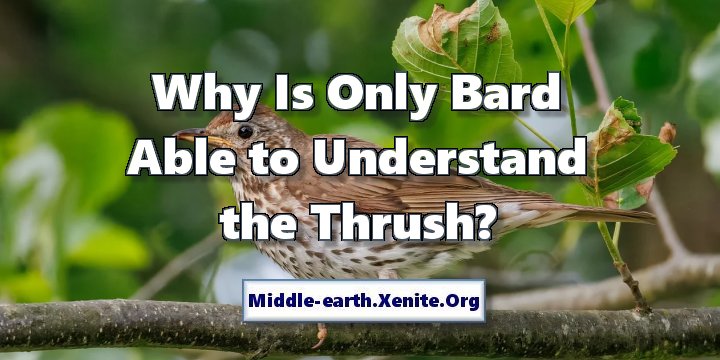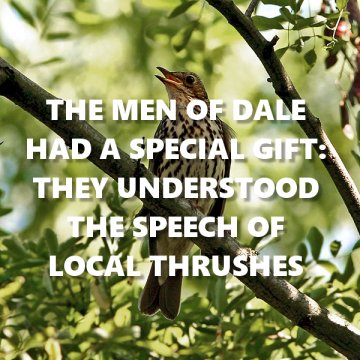
Q: Why Is Only Bard Able to Understand the Thrush?
ANSWER: When Bilbo is frustrated he throws a stone at an old thrush (the same one that speaks to Bard) and Thorin admonishes him:
“Leave him alone!” said Thorin. “The thrushes are good and friendly-this is a very old bird indeed, and is maybe the last left of the ancient breed that used to live about here, tame to the hands of my father and grandfather. They were a long-lived and magical race, and this might even be one of those that were alive then, a couple of hundreds years or more ago. The Men of Dale used to have the trick of understanding their language, and used them for messengers to fly to the Men of the Lake and elsewhere.”

This passage explains many things. First, it justifies Tolkien’s use of the thrush to convey the important knowledge to Bard of Smaug’s vulnerable spot (where the jewels do not cover the dragon’s heart). Second, it helps the reader believe that Bard really is the descendant of Girion of Dale because Bard is able to understand the thrush. Third, it shows that there are all sorts of magical creatures populating the landscape.
By this point in the story we have encountered the talking Wargs (wolves), the talking eagles, Beorn’s enchanted animal servants, the talking spiders of Mirkwood, and even the elusive white hart. So the reader should not be surprised to learn that there is a magical race of birds who were especially friendly with the Men of Dale.
The motif of a man communicating with birds is not unique to The Hobbit. Beren learned to speak with birds in Dorthonion after he became a solitary outlaw. But the befriending of the hero by “wild” animals — with whom he learns to converse — is an ancient motif drawn from both fairy tales and mythology. Tolkien appears to have been using the special bond between men and birds to imply that these men were special, somehow “blessed” and therefore to be accepted by his audience as Good Folk.
Keeping in mind that The Hobbit was originally devised for Tolkien’s children, especially his sons, the reader should be aware that the Good Guys are often imbued with special gifts and they tend to find allies in the darkest of times and most unforeseen of circumstances. The hand of providence, as it were, keeps the storing moving forward and gives the audience hope (and that is a very important aspect of story-telling, for the audience must empathize with the protagonists of the story).
Elrond echoed this motif when he advised Frodo at Rivendell about the journey to Mordor: “…You will meet many foes, some open, and some disguised; and you may find friends upon your way when you least look for it….” Genre writers who have followed in Tolkien’s footsteps with hero quest stories have repeated this formula many times.
Bard’s special relationship with the thrush thus marks him as Good, as the Heir of Girion, and as a hero whose own journey is dark and dangerous (although not central to the plot of The Hobbit). Although Tolkien was probably never tempted to write a story about Bard the Bowman, I think he would have made a good protagonist for one of Tolkien’s Middle-earth tales.
See also
What Is the Significance of the Thrush in The Hobbit?
# # #
Have you read our other Tolkien and Middle-earth Questions and Answers articles?

I wouldn’t be surprised if there’s fanfic about Bard somewhere.